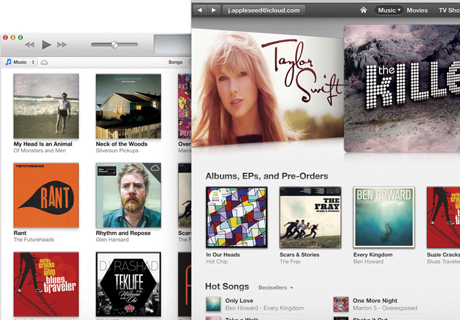Over the past decade, Apple’s iTunes has helped shape music discovery and consumption by providing a legal online model for distribution and sales. Since its 2003 launch, the iTunes Store has revamped the way music is distributed and has dismantled the traditional concept of the album. However, now there is concern that artists are not receiving proper creative and financial support with digital distribution expanding to multiple platforms.
 “We’re at an interesting point now,” said Internet exec Matt Graves. “It’s 10 years since Apple launched iTunes. We are only now seeing some of the forces set in motion 10 years ago. We are still grappling with what it all means.”
“We’re at an interesting point now,” said Internet exec Matt Graves. “It’s 10 years since Apple launched iTunes. We are only now seeing some of the forces set in motion 10 years ago. We are still grappling with what it all means.”
Before the start of iTunes, the idea of digital compressed formatting for music was practically non-existent as the Internet in the late 90’s did not have the bandwidth or amount of content it does today. However, once the MP3 player hit the market, the idea flourished, with sites like Napster and Beam-it changing the ways consumers listened to music, as reported in a three-part series by Engadget. These programs were ahead of their time with their primary cloud-based technology, but the music industry was not ready for such an extreme adjustment.
“It was something that came to me as a result of seeing sort of an unmet need and the passion people had for being able to find all this music, particularly a lot of the obscure stuff which wouldn’t be something you go to a record store and purchase,” said Napster co-founder, Shawn Fanning in a 2009 interview with the San Francisco Chronicle. “So if felt like a problem worth solving.”
Because sites like Beam-it and Napster provided free music and downloads, it caused major legal battles between the companies and record labels. Eventually it led to the sites being shut down in the early 2000s. This rift caused a mistrust of streaming music online and the music industry. People were now going to have to find another way to purchase and share music through the new MP3 technology. That was when iTunes came in to restore the burnt bridges. Within the first week, iTunes sold 1 million downloads, and Apple sold its one-millionth iPod the following month. From this the program continued to expand past the Mac desktop to other computers and devices.
“When iTunes launched, it was a bit of a feint,” said Jim Griffin, a former executive at Geffen Records and Warner Music. “The assumption made by the industry was that it would be Mac-only. They really didn’t picture the store quickly becoming a Windows store. That’s what a lot of [industry] people used to justify dipping a toe in the water. But it was a full-fledged jump.”
Now over the past decade, other companies have entered the online music field. With online ad based sites Spotify, Rdio, and Pandora, users do not have to pay for music anymore. While this may seem like a music lover’s dream, it has caused issues within the industry. Streaming music videos have also increased with sites like YouTube and Vevo uploading the latest music available anytime, anywhere. When their music is played, it is less revenue than the artist would have made by putting out a CD. So what does this mean for online music and record labels?
“If there is a digital music ‘promise’ to musicians, it is based on scale. Streaming services are still on a sharp growth curve. Given an immense streaming listenership, those micro-payments could add up more substantially. But the 72-point headline that musicians see is about the devaluation of music generally. The structure of the digital music industry is geared toward satisfying consumer demand for a constant stream of low-cost music, not the musician’s need to financially sustain creative careers,” concludes Engadget.
The iTunes influence, part one: How Apple changed the face of the music marketplace (Engadget, 4/29/13)
The iTunes influence, part two: Setting the music free (Engadget, 4/30/13)
The iTunes influence, part three: Art in the age of digital disruption (Engadget, 5/1/13)

No Comments Yet
You can be the first to comment!
Leave a comment
You must be logged in to post a comment.